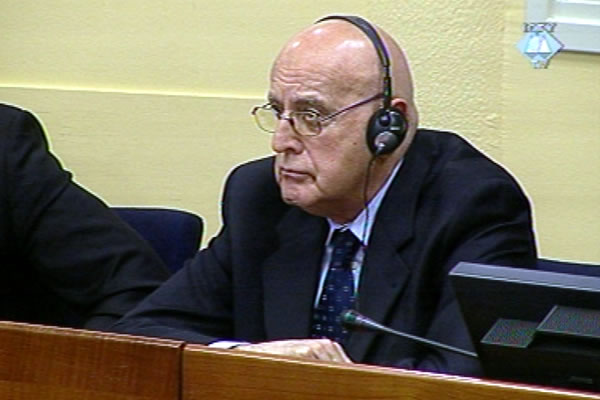Home
BEARA WANTS GENOCIDE CONVICTION QUASHED
As the appellate hearing continued today, Ljubisa Beara’s defense claimed that Beara couldn’t have been a participant in genocide, because he was acquitted of forcible expulsion of civilians and found guilty ‘only’ of mass executions of the captured men and boys. The prosecutor responded that the Srebrenica genocide centered on the murders in which Beara had played a key role
 Ljubisa Beara in the courtroom
Ljubisa Beara in the courtroom After Vujadin Popovic’s defense presented its oral arguments yesterday, today the appellate hearing continued with the defense of Ljubisa Beara, former chief of security in the VRS Main Staff, who addressed the Appeals Chamber headed by Judge Robinson. Beara is the second of the five convicts who have appealed against the judgment for genocide in Srebrenica. Beara’s defense lawyers explained why in their view Beara should be acquitted of all charges or, alternatively, his life sentence should be commuted.
Beara’s defense counsel Norman Sepenuk addressed the Trial Chamber on Beara’s behalf, saying that his client should not have been convicted of taking part in genocide since he was acquitted of the count charging him with forcible transfer of the population. In summary, the defense counsel argued that at previous trials for the Srebrenica crimes the conclusion that the genocide existed was based on the ‘combination’ of evidence on the killing of men and boys on the one hand, and forcible transfer of women and children on the other. Since the Trial Chamber concluded that Beara didn’t play a role in the expulsion of civilians, but ‘only’ in the killing of the captured men, Beara couldn’t be found guilty of genocide.
Developing the argument further, Sepenuk said that ‘as horrible as it sounds’, the murder of 5,300 persons – or ‘less than one per cent of the total number of Muslims in BH’ was insufficient for the conclusion that there was genocide. This is why, Sepenuk argued, the previous Srebrenica judgments had to bring in the forcible transfer of the population to increase the number of victims. The judgment in the case against the seven Bosnian Serb military and police officers who were charged with crimes in Srebrenica, stated that 5,336 victims of the Srebrenica genocide were identified. The actual figure could reach 7,826, the judges noted. Recently, at the trial of Ratko Mladic, it was stated that 6,849 Srebrenica victims had been identified so far.
Apart from claiming that Beara was not responsible for genocide, the defense argued that Beara didn’t participate in the joint criminal enterprise aimed at killing thousands of Srebrenica men and boys in July 1995. Defense counsel John Ostojic claimed that the evidence of Beara’s involvement in the murder operation was ‘scarce’. In Ostojic’s words, the various exhibits fail ‘to corroborate each other’, while the witnesses were ‘unreliable’. The defense also noted that the findings on Beara’s movements in the territory where the genocide was committed were not supported and there were indications that he was in Belgrade from 13 to 15 July 1995.
The prosecutor summed up the defense’s arguments as follows: Beara contends that in the relevant period he was not in the area where the crime was committed. Even if Beara’s alibi is ‘false’, the Appeals Chamber should take his word that he didn’t participate in the killings. If that doesn’t work, Beara will at least call for a milder sentence. The prosecution contends that the accused is responsible for genocide and that life imprisonment was an adequate sentence.
Prosecutor Matthew Gillet presented a map of Eastern Bosnia showing Ljubisa Beara’s movements at the time of the Srebrenica genocide according to the Trial Chamber’s findings. Based on the testimony of a number of witnesses, the trial judgment concluded that on 13 July 1995 Beara planned the killing of captured Muslims in the center of Bratunac with Miroslav Deronjic. Beara then followed the mass executions and spent time at the places where the prisoners were detained and executed. According to the prosecution, Beara’s movements ‘correspond with the murders’ committed in the area around Bratunac and Zvornik. Beara was ‘omnipresent’ and ‘one of the most responsible persons’ for the killing operation. Therefore, the Trial Chamber was correct when it sentenced Beara to life, the prosecutor concluded.
The fact that Beara didn’t participate in forcible transfers doesn’t exonerate him from the responsibility for genocide, the prosecutor argued. Beara was aware of the scale of the expulsion of Muslims civilians and participated in the murder operation that was at the heart of the Srebrenica genocide. Beara was ‘determined to kill as many Muslim men and boys in as little time possible’. In the patriarchal context of Eastern Bosnia this could result in the extermination of an entire group, as it was noted in the Radislav Krstic’s appellate judgment.
At the end of the hearing, Drago Nikolic’s defense team began presenting their arguments.
Linked Reports
- Case : Popovic et al. - "Srebrenica"
- 2013-12-02 SREBRENICA ‘FIVE’ BEFORE APPEALS CHAMBER
- 2013-10-03 APPELLATE HEARING IN ‘SREBRENICA FIVE’ CASE SCHEDULED
- 2010-06-10 TWO LIFE SENTENCES AND 89 YEARS IN PRISON FOR GENOCIDE AND OTHER CRIMS IN SREBRENICA AND ZEPA
- 2013-12-04 DRAGO NIKOLIC ARGUES HE WAS ‘NOBODY’
- 2013-12-05 PANDUREVIC BLAMES MLADIC, BEARA AND POPOVIC FOR GENOCIDE
- 2013-12-05 MILETIC’S DEFENSE BLAMES MANOJLO MILOVANOVIC
